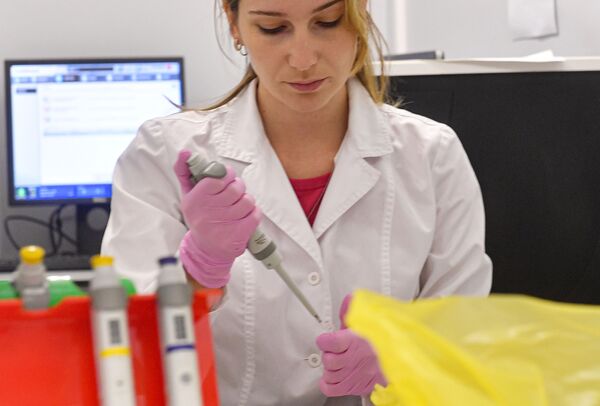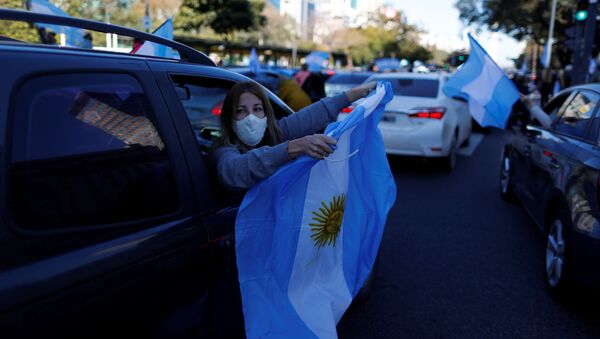On Monday, Argentina registered a record-breaking 8,713 confirmed coronavirus cases and 381 COVID-related deaths in just 24 hours. To date, the country has reported 350,867 infections and 7,366 fatalities.
The latest hike followed a nationwide march that took place on 17 August with thousands of Argentine protestors calling for the lifting of the COVID restrictions and restarting the economy. Since late March the cabinet of President Alberto Fernández has maintained strict quarantine measures arguing that securing the nation's health would help the country to recover more quickly. As the growing recession started to sting, sporadic anti-lockdown protests erupted in Buenos Aires and some other cities in May and continued through July. On 14 August, the government announced its intention to extend anti-COVID measures in the Buenos Aires region until the end of the month, triggering a new wave of demonstrations.
COVID Has Dealt a Blow to Argentine Economy
"I believe the government did the best it could do when they dictated the quarantine back in March", says Argentine lawyer, author and political analyst Gonzalo Fiore Viani. "The lockdown and the COVID-19 have caused a lot of damage to the Argentine economy. I think that the lockdown maintained by the government was worth the pain but right now most people cannot remain locked up and that is indicated well by the numbers of infected and deaths".
Argentina is one of the largest economies in Latin America with a gross domestic product (GDP) of approximately $450 billion. However, according to the World Bank, the country has long been suffering from an economic crisis with the Argentine peso losing 68% of its value since 2018.
The COVID pandemic has added insult to injury: the country's economic activity slumped by 12.9 percent in the first half of 2020 compared with the same period of 2019, according to the National Institute of Statistics and Censuses (INDEC). The economy slightly rebounded in June from May due to some relaxation of restrictions on movement, but in July the government was forced to toughen lockdown measures again.
"It’s true that the country has had really bad numbers and it was in recession for the last four or five years", admits Viani. "The Mauricio Macri’s government was really bad for the economy as well as for medium and small-sized businesses because of the inflation and the import of goods".
Nevertheless, the opposition is pinning the blame firmly on Alberto Fernández for the sliding economic indicators.

Anti-Lockdown Protests are Fuelled by Opposition
The ongoing anti-lockdown and anti-government protests are largely fanned by Fernandez' antagonists and right-wing forces, according to Viani.
"We have a strange phenomenon right now in Argentina: maybe for the first time in its history, the right wing parties and movements are taking to the streets massively and frequently", the author observes. "That was Peronists' territory historically, but now the opposition is going out to defy the government and the restriction because of the virus".
Touching upon the protests, Buenos Aires Times noted that some of the demonstrators' placards condemned vaccination and alleged that the anti-COVID lockdown "is part of a global plot to subdue citizens". Some of the protestors bemoan the fact that Mauricio Macri is not at the helm, praise Trump and suggested that if he were in Argentina's government, "it would be another type".
"While former president Macri went to Europe and left vacant the leadership of the opposition centre-right PRO party, people from his party like former Security Minister Patricia Bullrich have taken that role", the Argentine political analyst notes.
Patricia Bullrich enthusiastically attended the 17 August demonstration while ex-President Mauricio Macri tweeted that he was “proud” of the demonstrators. While no political party formally organized the protest movement, PRO and their allies have jumped at the opportunity to politically exploit the popular discontent. In contrast, the centre-right Juntos por el Cambio opposition coalition appears to embrace a more cautious approach. According to Viani, the Peronist government's opposition has now split into two wings: a moderate and a "radical" one. It remains unclear how it will play out for them in the next elections, he remarks.

Is COVID Vaccine a Panacea for the Economy?
In order to improve the health and economic situation in the country the Fernandez government is seeking an effective anti-COVID vaccine.
In mid-August, mAbxience, the biotec company of the Spanish Insud Pharma group, announced that it had struck an agreement with the pharmaceutical company AstraZeneca to produce a potential COVID-19 vaccine in Latin America, at its newly inaugurated plant in Garin, Argentina. According to the agreement, the firm will initially produce 150 million doses of the active substance for AstraZeneca's potential anti-COVID drug if it successfully passes Phase 3 trials.
Argentina has recently approved Phase 3 clinical trials for a coronavirus vaccine developed by China National Biotec Group (CNBG), while the Argentine province of Tierra del Fuego has signalled interest in producing Russia's Sputnik V, the world's first registered anti-COVID drug.
"Buenos Aires is considering all vaccines that are in phase 3 of testing: the Oxford (AstraZeneca) one, the Russian one, the Chinese one, and even the Cuban one", Viani points out. "The Tierra del Fuego government is part of the Fernandez party too. I believe that Russian vaccine will be a viable option for the Argentine people once it’s out".
According to the political analyst, the Argentine media is covering a COVID vaccine issue depending on their political affiliation. Thus, the right-leaning media has expressed skepticism about the Russian vaccine while the government officials received the news about its registration on 11 August with great enthusiasm, Viani underscores.
"The country's health minister, Gines Gonzalez Garcia, has spoken good about the Russian vaccine, the president sent a letter to Vladimir Putin congratulating him about the great achievement when the news came out", he says.
Still, while praising the world's efforts to produce an anti-COVID vaccine, the analyst deems that it is not enough to fix Argentina's plummeting economy.
"I think there are too many expectations about the vaccine", the author says. "It is true that it will be key to begin normalising the economy, and heal the psychological consequences of the pandemic, but taking care of the Argentine poor remains the main challenge for the government".




